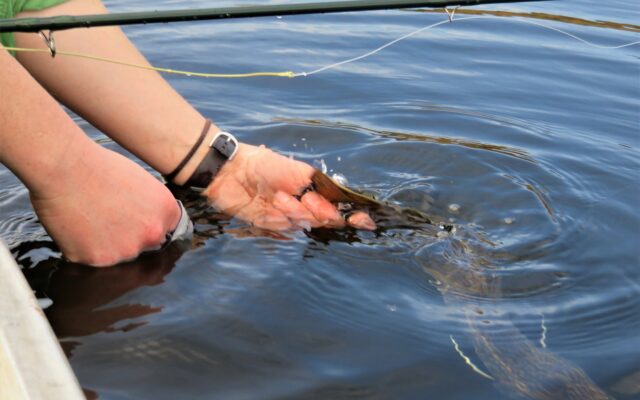
There’s more to harvesting Maine’s wild native fish than ethics
By Bob Mallard
In a recent column, V. Paul Reynolds defended harvesting wild native brook trout while challenging those who practice catch-and-release. He invoked ethics and spoke for both Native Fish Coalition and Trout Unlimited.
While I will not speak for Trout Unlimited, I am the executive director for Native Fish Coalition, and here is my response.
Ethics is personal — what’s ethical to one person is unethical to another. To some, staying within bag limits is ethical. To others, releasing their catch is ethical.
Our publicly documented position on harvesting wild native fish is more than five years old, flexible and pragmatic. It is hardly, “strongly opposed to the killing and eating of any native brook trout taken from a State Heritage Fish Water,” as Reynolds claimed. We are not absolutely opposed to the sustainable harvest of wild native fish. We are, however, opposed to harvest that results in noticeable decreases in population size, geographic distribution or age/size-class distribution — all of which can negatively impact populations and lead to calls for stocking.
I have spent decades fly-fishing for wild native brook trout — it’s become my greatest passion. Though I once kept some of my catch, I now practice strict catch-and-release to help preserve these precious resources for future generations. I’ve learned that harvesting fish isn’t necessary for fulfillment.
Beyond eliminating fishing entirely, the most effective way to minimize angler impact is avoiding harvest and refraining from using high-impact tackle and techniques. While highly abundant wild brook trout populations can withstand some harvest, low abundance populations can be severely impacted.
Anyone who has fished for wild native brook trout for any length of time has seen the negative
impacts of harvest. There is a term in Maine: “fished out,” which refers to waters where angler harvest has degraded fishing. It has been used for generations. One of my favorite ponds has declined notably over the years, with angler harvest appearing to be the cause.
Maine’s State Heritage Fish law protects waters from stocking and dangerous live bait use, not from harvest. Less than 2 percent of these waters is managed for catch-and-release, while over 40 percent has a five-fish bag limit and 6-inch length limit — the lowest protection for brook trout under Maine law.
Fisheries management involves managing fishermen as much as fish. We push fish resources much further than game resources, using stocking to mitigate over-harvest and demanding more from fisheries than they can sustainably provide.
Native Fish Coalition discourages harvesting wild native brook trout for biological reasons, but we stop well short of calling harvest unethical. Such statements undermine efforts to preserve this unique, fragile and irreplaceable resource.
Zero-harvest in regard to wild native brook trout is a voluntary precautionary approach, not a mandate or moral high ground. Releasing fish is what some do to protect the resources they love — it’s selfless, not selfish.
If we only obeyed regulations “set by Maine’s professional fisheries biologists,” our wild native brook trout resources would collapse under aggregate impact as they have previously. Regulations only work because many don’t harvest what the law allows. Maine’s fishing regulations vary radically and often are liberalized to promote usage and harvest.
Keeping an occasional wild native brook trout is a small part of a much larger issue – it’s when dozens or hundreds of anglers do so that problems arise. I admire every wild native brook trout I catch. I simply choose to release them.
Practicing zero-harvest and encouraging others to do so doesn’t undermine conservation — it promotes it as a personal choice.
Reynolds’ misrepresentation of Native Fish Coalition and Trout Unlimited only serves to pit sportsmen against sportsmen. By using terms like “troubled by the message,” “often implied,” “cast moral judgment” and “guilt-tripping,” Renolds unfairly targets people who simply see things differently.
Reynolds should be grateful that many anglers minimize their impact, as it benefits both the resource and sportsmen. While harvesting fish reflects personal values, it’s not about conservation. And regarding wild native pond-dwelling brook trout — lost throughout most of their native range, including parts of Maine — you can never be too careful.